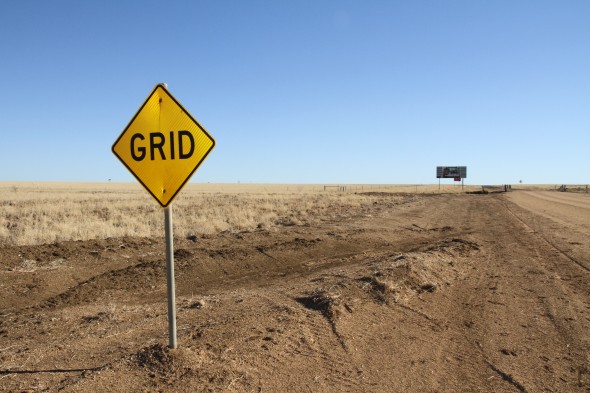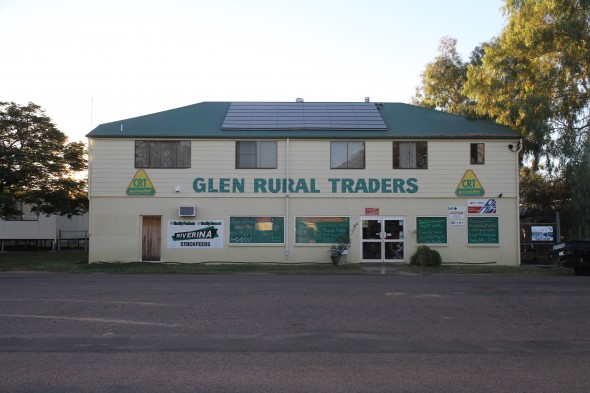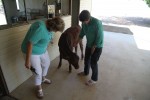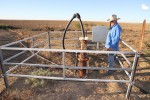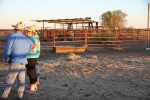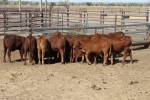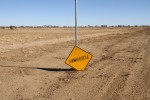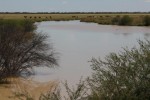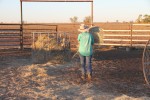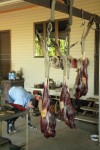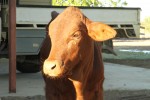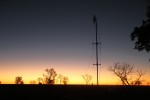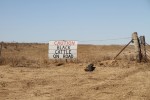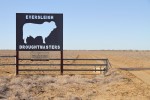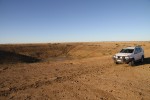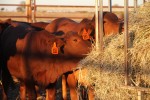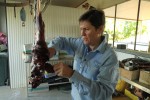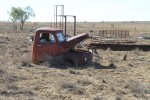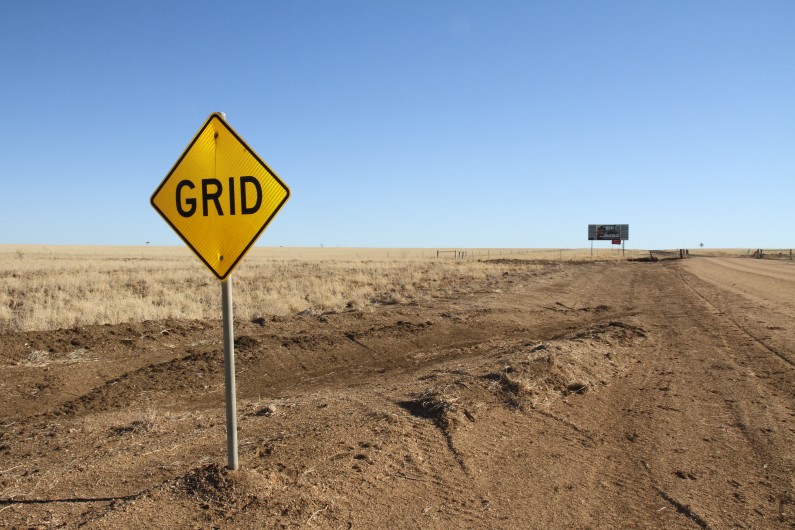
The Great Dry
Imagine living in a town where the weather dictated almost everything in your life. Your immediate thought might have been a remote village in far northern Canada, where snowfall intensity can mean the difference between life or death. Or perhaps your first thought was of a far-flung desert camp in the Middle East, where it is too hot to venture outside during the day and sandstorms bring pain and property damage. Unfortunately, the town in question is far closer to home.
Longreach, in Central-Western Queensland, is representative of so many small towns in Queensland and New South Wales. The town itself has been drought-declared since September 2013, however many of the surrounding areas were drought-declared well before that date.
Droughts are not uncommon in Western Queensland. There have been a number of droughts affecting the area in the last few decades, with a particularly lengthy and intense dry spell in the early 90s. However, most dry stretches only last for 18 months to two years and are only particularly intense in specific areas, with some other regions embracing lush pastures. The current drought is bucking the trend. The rain deficiencies are widespread, with many areas approaching their third consecutive year of dry.
For many who live on the land, the drought means a complete change of lifestyle; hand-feeding cattle, digging bores to tap into the Great Artesian Basin, and installation of new irrigation and water management infrastructure. Graziers begin to feel the pinch of a drought almost immediately as their workload goes up and their income falls. However, for townspeople, there is a small delay before the pinch is felt.
Often, graziers are able to use the money from a previous year’s sales to fund themselves for a year into the drought. They spend their money in town on groceries, hardware and luxury items. However, as the rivers and creeks begin to run dry, so does the cashflow that runs through town.
“In the first two years, people would come and they wouldn’t blink at buying one or two items, spending $1000, $1500 at once.”
Ele Deane is the owner and operator of The Tack Room, a high-end ladies fashion store on the main street of Longreach, and a grazier. She took over the store in 2012 right as the drought was beginning and she has seen a noticeable drop off, not only in her business, but in the numbers of people coming into town.
“When you go to town you have to make the most of it. You go and buy $500 worth of groceries, you do get everything all at once and you might not come back to town for quite a while. Lately though, people are baulking at one item or you just don’t see people coming in to town.”
What’s more, certain businesses are hurting more than others.
“It doesn’t matter what you’re selling, its a knock-on effect through the whole community… We are down about 75% on sales. Which is nuts, because we’re basically holding out until it rains. We’re one of the only clothing stores in town… and we have a niche market, which we’re very fortunate to have. Where you have two bakeries and five motorbike shops, the guys that are competing against each other are suffering even more.”
Perhaps some relief will come to Longreach in the coming months in the form of the annual tourist season that begins in May and carries on through until September. Tourists from the major cities and from around the nation come through town on road trips. Many of whom make Longreach an annual stop on a year-long touring schedule to visit some of the regions attractions such as the National Stockman’s Hall of Fame and the Winton Dinosaur Museum.
Alison and Rhett Mobbs are property owners and the proprietors of the Jumbuck Motel. They purchased the motel in July 2014 and have since spent considerable time and money getting geared up for the increase in traffic. They are very excited for the promise that the tourist season brings.
“No cattle sales here for more than twelve months has reduced the amount of traffic through town. Truck drivers aren’t getting work and contract musterers don’t exist anymore. They’ve all found other jobs and livestock agents don’t travel and stay at the motel. So until it rains, there is going to be less traffic from the local area,” says Alison. “In the tourist season we get a lot of people traveling up to get away from the bitter cold in the South, coming up here to enjoy the beautiful sunshine.”
Alison and Rhett are looking to move off their property south of Blackall into town. But without any rain, making the move is difficult. According to Rhett, though they are lucky enough to have more than enough feed on their land due to the abundance of the edible Mulga tree. They currently have other people’s cattle on agistment people aren’t looking to purchase without a sign of growth.
“There are not many opportunities in dust,” says Rhett, “Rain has opportunities for a lot of people. Drought doesn’t bring much to anyone that I know of.”
The change in the usual habits has hit Judy Glen and her business hard as well. Judy runs Glen Rural Traders, a one-stop-shop for all kinds of supplies from dog food to PVC piping, firearms and ammunition. Judy says that people have all but stopped purchasing shearing supplies while firearms and ammunition sales are on the rise as people are forced to protect what few stock they have from dingoes and foxes. She also believes that one of the main indicators of business fare that she has noticed in her 28 years of operation is her phone bill. With sales declining, the outgoing calls to customers and suppliers fall too.
Bill Ringrose is an accountant who works closely with many of the businesses in town as well as with the graziers on the land. He says that it has taken until this third year of drought to really see the full effect of the flow-on from the drought hitting businesses in Longreach.
“We’re really in a difficult situation in town, because the grazing industry just doesn’t have any money.”
Bill believes that the people who will come out on top when the drought starts to ease are people who had managed to prepare; diversifying and subsidising their incomes.
“Some people subsidised their income from the land before the tough years with share portfolios or their wives worked in town as teachers and nurses. Unfortunately, people have had to sell these subsidies and their best plans to spread their risk out aren’t working anymore,” he says.
With people losing jobs, families are moving from town and unfortunately the spiral starts to worsen for businesses who might have been able to keep on keeping on otherwise. From medium sized regional centres like Longreach, the effect could move into slightly larger towns, hitting regions who rely on industries secondary to agriculture (such as towns with meat works).
However in recent months some relief is starting to flow in to town, thanks to charity donations and people in Metropolitan areas coming to realise the scope and intensity of the drought. Charities like Buy-a-Bale directly support farmers by allowing city residents to purchase a bale of hay to feed stock. Others, such as Baked Relief offer psychological support, with donations coming in the form of baked goods sent to struggling families to assure them otherse are thinking of them in their plight.
Aside from his role as an accountant, Bill Ringrose is also part of the Western Queensland Drought Appeal (a local organisation that aims to more effectively distribute the aid that is coming in to town). He says that while direct purchases of hay and feed are appreciated, they may actually be doing more harm than good. He says that local businesse, which would often stock many of the items that people are donating are missing out on the crucial sales and as a result, are having to lay staff off.
“We’re asking for cash donations which will allow us to create a bankcard system so that people can only spend the donated money in the local towns. It will mean that the graziers will be able to help stimulate the town,” says Bill, “Donations, as well meaning as they are, are just taking away from businesses in town.”
Like many people in town, Alison Mobbs also works in two roles and is the President of the Queensland Rural and Regional Women’s Network (QRRWN). The network is a collection of volunteer women who connect with and inspire each other, offering educational and networking opportunities. She believes that communication is the key to effectively coordinating relief that is coming in to town. QRRWN was involved in the Baked Relief program when it began to flow in.
“While that means that people care it doesn’t solve anything in the long term. However, it is wonderful to know that people care and that they’re thinking of us,” she says.
In partnership with the Longreach Regional Council, the local rotary club called a meeting to specifically coordinate the effort. Alison believes that this kind of communication is essential to long-term relief.
QRRWN is working to help people who have the knowledge and experience from the land to step up and help to make the decisions about the region and its management. The Network offers leadership training and platforms for people to share their stories through blogging and online videos and showcase the traits that make communities resilient.
For people enduring these tough times, mental health is a major issue. From her position as State President of the QRRWN, Alison is in contact with a lot of people and families from all around. She says that there are many people who are struggling on, despite not having any income for a third year in a row.
“The slow insidiousness of the drought is what sneaks up on people and they don’t know how badly they’re doing,” says Alison. “I would encourage people in metropolitan areas or areas that aren’t in drought to be part of a conversation.”
Ele Deane believes she has some idea of how people are pulling through.
“You see a community suffering; you might see a smiling face down the street but its bad out there. When there’s an event on, its so nice to see people make the effort to come and socialise. It’s so good for the community.”
Big regional social events such as the local show and country race days are integral in giving people something to look forward to and to bring them together to celebrate.
“Country racing has always been the pinnacle of the social calendar in the country,” she says, “you see the girls really go to all sorts of effort for the day, and that brings the boys in, which is just great for the whole community.”
Community social days may be the best way for people to release in the short term. Although, it looks like the only real way out for many towns in western Queensland and right across drought-stricken areas would be for substantial rains in the immediate future. Until then, the strength and resilience of the people may be the only thing that will give regional Queensland towns the strength to carry on.
- The drive to Eversleigh is approximately 1300km northwest of Brisbane, close to the geographic centre of Queensland
- Though many of the areas look dry, this foot-high grass would be a godsend for many drier areas.
- Lydia, a poddy calf, was left by her mother soon after birth, when she was unable to support her twin calves. Jenny and Roger have hand fed Lydia in the 5 months since.
- With rainwater nowhere to be seen, a back up water supply comes in the form of 700ft bores down into the Great Artesian Basin.
- Many days and evenings are spent down at the yards, moving the cattle around, and getting them sorted for their work in the morning.
- Dixie has been working at Eversleigh since 2003, and now in her older years, she has started to lose her eyesight.
- The weaner calves have to be encouraged by the universal incentive – food – in the form of fresh hay.
- On the road, you pass through some of the most diverse landscape, from the coast, though lush, green, rolling pastures and into the drought affected plains.
- Roadsigns have even realised the climate, taking to ironically collapsing on themselves.
- Little Horse Dam in early 2012, after a summer of decent rain. Photo Credit: J. Underwood, 2012. Used with Permission
- With the drought, physical labour has stepped up, as Jenny and Roger have begun to need to hand feed their cattle.
- Though it is a somewhat gruesome one, the reality on isolated properties like Eversleigh is that kangaroos threaten livelihoods, and as such, often require to be shot.
- Lydia lives close to the house, and often acts as a guard dog, alerting Jenny and Roger to arriving guests.
- Though there are times that communications are tough, Eversleigh has recently been connected to the NBN.
- Throughout the journey, the conditions of the road go from asphalt to single-lane dirt trails and everything in-between at various times.
- Jenny and Roger Underwood own and operate the Eversleigh property, where they run Droughtmaster cattle.
- Little Horse Dam as it sits today, just three years later. There has been no water whatsoever in the dam since late 2013.
- The weaner calves are a handful as Jenny and Roger attempt to get them used to being mustered and handled away from their mothers.
- So as to not waste the animals that they have to kill, Jenny and Roger always make sure the lean leg meat goes to an ever-hungry Dixie.
- Roger has been on Eversleigh since the 1980s, however, some of the relics around the property hark back even further.

